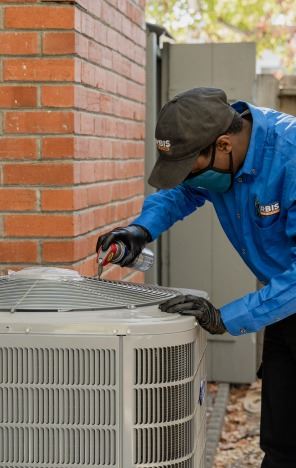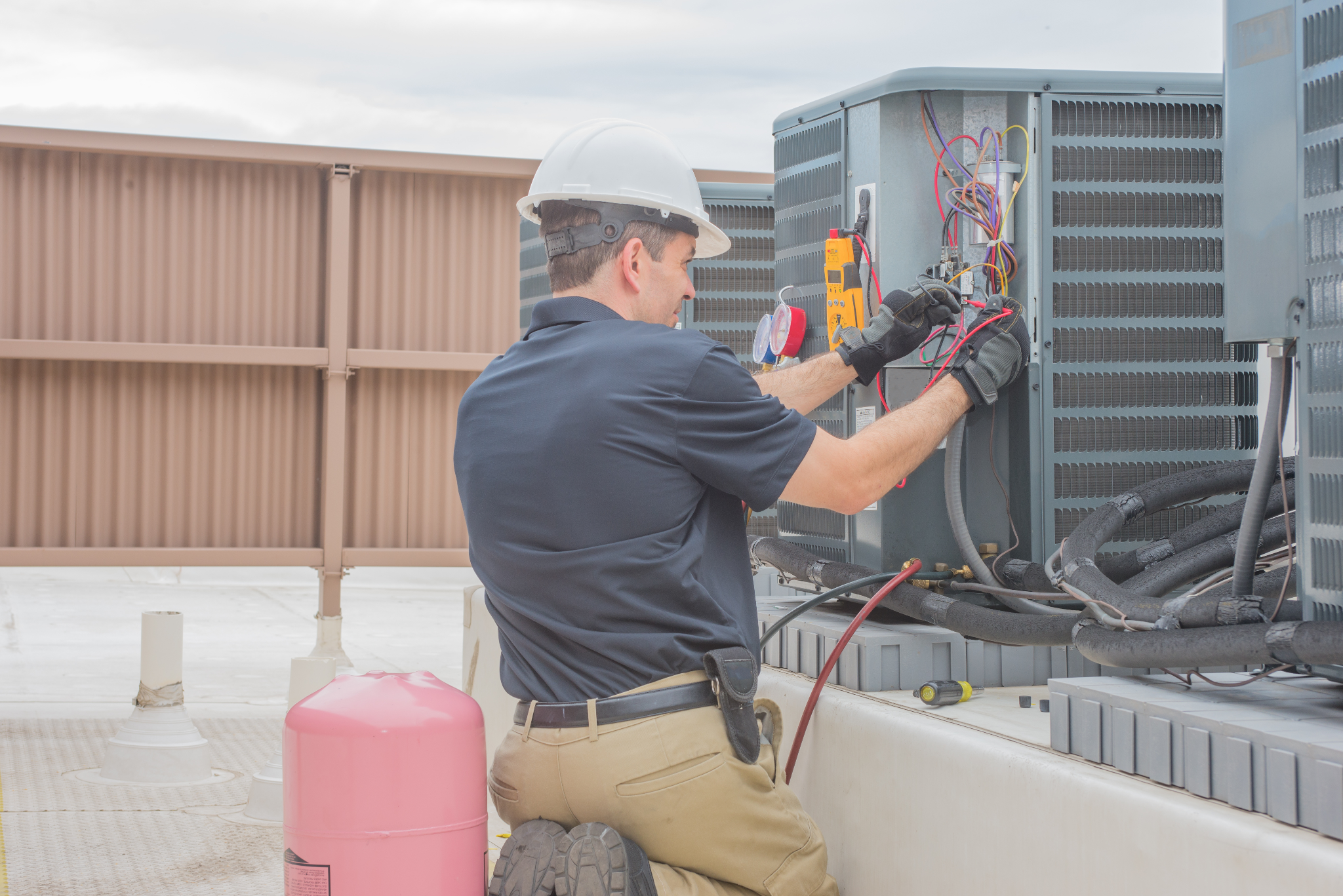Professional Tips for Seamless heat pump replacement ooltewah tn
Professional Tips for Seamless heat pump replacement ooltewah tn
Blog Article
Selecting In Between a Heatpump and Heater: Key Factors To Consider for Your A/c Demands
When evaluating home heating choices for heating and cooling needs, the choice between a heatpump and a heating system can be complicated. Each system offers unique advantages customized to details climates and power effectiveness goals. Understanding these differences is crucial for making an enlightened selection. Secret elements such as setup costs and environmental influence further make complex the option process. Which choice absolutely lines up with one's convenience and sustainability preferences? The adhering to areas will discover these factors to consider in detail.
Recognizing Heat Pumps: Exactly How They Function and Their Benefits
While numerous property owners think about numerous heating choices, recognizing just how warmth pumps function and their benefits can significantly influence their choice. Heatpump run by moving heat as opposed to generating it. In the winter season, they remove warmth from the outdoors air or ground and transfer it inside your home, while in the summer, they reverse this process, cooling the home by expelling heat outside. This dual performance makes them flexible for year-round environment control.One of the key advantages of heat pumps is their energy efficiency. They make use of considerably less power compared to conventional heater, potentially causing reduced energy costs (ductless mini splits). In addition, heatpump have a smaller carbon impact, making them an ecologically friendly choice. They also call for much less upkeep than conventional systems, adding to long-term expense savings. In general, recognizing the technicians and benefits of heat pumps can aid house owners make educated decisions regarding their heating and cooling requirements
Checking Out Heaters: Kinds, Procedure, and Advantages
Heating systems are available in various kinds, consisting of gas, electric, and oil models, each with unique functional mechanisms. Understanding these distinctions is essential, as they influence effectiveness and heating performance. Furthermore, heaters supply numerous benefits, such as constant heat output and integrity in colder environments.
Kinds of Furnaces
Heater can differ substantially in style and procedure, with heaters being a preferred option amongst home owners. There are numerous kinds of heating systems, each utilizing various gas resources and innovations. Gas furnaces are common, leveraging natural gas to produce heat successfully. Electric heating systems, on the various other hand, use electric resistance to generate heat, often favored for their simple installment. Oil heating systems, while less common, work in areas with minimal gas access (heat pump replacement ooltewah tn). Additionally, condensing furnaces make the most of power efficiency by recording and recycling exhaust gases. Each type runs via a system of warmth exchangers and ductwork to distribute warm air throughout a home. Comprehending the differences between these heating system types is vital for notified HVAC decisions
Benefits of Heating systems
For home owners seeking reliable warmth during cool months, the benefits of heating systems are significant. Heating systems offer constant heating, guaranteeing also temperature levels throughout the home. They are especially efficient in extreme cool, commonly outperforming heat pumps in freezing problems. Numerous kinds, consisting of gas, electric, and oil heating systems, supply flexibility to fulfill varied requirements and preferences.Furnaces additionally often tend to have reduced preliminary setup costs contrasted to heat pumps, making them a much more accessible option for numerous. Their robust layout adds to a much longer life expectancy, with numerous systems lasting over 15 years with appropriate upkeep. Furthermore, contemporary heaters are typically equipped with innovative modern technology for boosted effectiveness, which can result in reduced energy expenses. Overall, furnaces remain a reliable selection for reliable home heating.

Energy Performance: Contrasting Warmth Pumps and Furnaces
When comparing power efficiency between warmth pumps and heaters, the Seasonal Power Efficiency Proportion (SEER) plays a necessary function in establishing efficiency. Furthermore, an operational price analysis exposes the long-lasting monetary ramifications of each system. Recognizing these variables can assist house owners in making notified choices regarding their heating remedies.
Seasonal Energy Effectiveness Proportion
Power effectiveness plays a necessary role in the decision-making procedure between warm pumps and furnaces, specifically when thinking about the Seasonal Power Effectiveness Proportion (SEER) This statistics actions the cooling performance of warmth pumps over a whole air conditioning period, giving a standard way to evaluate performance. Greater SEER ratings indicate better energy performance, converting to lower power usage and decreased energy costs. On the other hand, heaters are normally examined utilizing the Yearly Fuel Application Effectiveness (AFUE) ranking, which shows home heating performance. When contrasting these 2 systems, home owners should focus on SEER scores for heatpump, as they straight impact general power savings and environmental sustainability. A detailed understanding of SEER can notably affect the long-lasting fulfillment and cost-effectiveness of the picked heating and cooling remedy.
Operational Cost Evaluation
Comprehending the functional prices related to heatpump and heaters is vital for property owners reviewing their options. Warm pumps typically offer higher power efficiency, converting electric power right into warmth with marginal waste. This results in lower month-to-month energy expenses, particularly in moderate environments. On the other hand, typical furnaces, especially gas models, may have reduced ahead of time prices however can incur higher functional expenses in time because of sustain prices and effectiveness ratings.Moreover, heatpump can work as both home heating and cooling down systems, possibly minimizing the demand for different HVAC systems. While first financial investments for heat pumps might be higher, their lasting financial savings in energy performance can make them a much more affordable option for lots of families. Careful evaluation of local power prices is essential to establish the best option.
Setup Expenses: What to Anticipate for every Furnace
Setup expenses for furnace can differ significantly in between heatpump and heating systems, influencing house owners' decisions. Heatpump generally have greater in advance setup costs, generally varying from $3,500 to $8,000, depending on the device size and intricacy of setup. This consists of the exterior unit, indoor handling system, and needed ductwork adjustments. On the other hand, heating systems often tend to have reduced first expenses, balancing in between $2,500 and $6,000, which can be appealing for budget-conscious home owners. Nonetheless, setup expenses can boost if comprehensive ductwork is required.Moreover, the selection of gas kind for heaters-- natural gas, gas, or electrical-- can additionally affect setup costs. While heatpump supply energy efficiency, their initial investment may hinder some purchasers. Inevitably, reviewing installation costs alongside long-term savings and effectiveness will certainly aid property owners in making informed decisions about their heating unit.
Climate Factors To Consider: Which System Carries Out Much Better in Your Location
Just how do climate conditions influence the performance of furnace? The performance of warm pumps and furnaces can differ substantially relying on the neighborhood climate. In modest climates, heatpump stand out by efficiently transferring warmth from the outdoors air, making them an energy-saving alternative. recommended you read Nevertheless, their effectiveness reduces in extremely cool temperature levels, where they may have a hard time to extract adequate warm. Alternatively, furnaces, especially gas designs, give consistent and trustworthy warmth no matter outdoor problems, making them better in colder regions.In locations that experience milder wintertimes, heatpump can operate properly year-round, offering both home heating and cooling. On the other hand, regions with harsh wintertimes usually gain from the effectiveness of heating systems. Inevitably, comprehending the local environment is important when making a decision between a warm pump and a furnace, as it straight affects their operational performance and overall efficiency.
Upkeep Needs: Long-Term Care for Heat Pumps vs. Furnaces
While both warmth pumps and heaters call for routine upkeep to ensure peak efficiency, their specific demands and treatment regimens vary considerably. Heaters commonly require less frequent attention, with yearly examinations sufficing to examine for gas leaks, tidy filters, and assess general capability. Their less complex style often permits for straightforward repairs.In contrast, warm pumps necessitate biannual upkeep as a result of their dual function in heating & cooling. This includes cleaning coils, checking refrigerant levels, and making sure that both the indoor and outdoor devices work at their best. In addition, warmth pump upkeep often includes even more detailed components, making professional maintenance essential.Neglecting maintenance can result in reduced performance and increased power costs for both systems. Eventually, homeowners must take into consideration these long-term treatment requirements when selecting between a warm pump and a heating system, as aggressive upkeep can extend the lifespan and performance of either system considerably.
Ecological Effect: Selecting a Lasting Heating Alternative
The ecological impact of home heating systems is a critical examination for home owners seeking lasting options. Heat pumps are typically more energy-efficient than typical heaters, as they transfer warm instead than produce it, greatly reducing carbon discharges. By utilizing renewable resource resources, such as air-source or geothermal heat pumps, house owners can better reduce their ecological footprint.On the various other hand, gas furnaces release greenhouse gases and add to air pollution, though they often give greater warmth outcome. Developments in technology have actually led to the development of high-efficiency heaters that minimize emissions.Ultimately, selecting a heating system involves weighing efficiency versus environmental impact. Homeowners are urged to reflect on regional power sources and rewards for renewable systems, making certain an option that aligns with both personal comfort and ecological responsibility. The choice influences not just instant convenience however additionally lasting sustainability and ecological wellness.
Regularly Asked Questions
For How Long Do Warmth Pumps and Furnaces Commonly Last?
The life-span of warm pumps typically varies from 15 to twenty years, while furnaces can last between 15 to 30 years. Normal upkeep considerably affects their longevity and performance in supplying home heating services.
Can I Make Use Of a Warm Pump in Very Cold Climates?
Heatpump can run in incredibly chilly environments, but their effectiveness diminishes as temperatures drop. In such conditions, supplementary heating sources might be necessary to maintain comfy interior temperatures and ensure peak efficiency.

What Is the Sound Level of Warm Pumps Versus Furnaces?
The sound degrees of heat pumps and furnaces differ considerably. Generally, warmth pumps run even more silently than standard furnaces, making them better for those delicate to seem, while heating systems might create louder operational noises during home heating cycles.
Are Warmth Pumps Suitable for Both Cooling And Heating?
Heatpump are certainly suitable for both home heating and air conditioning (ductless mini splits). They operate by moving warm, giving reliable like this temperature level control year-round, making them a flexible option for homeowners seeking an all-in-one heating and cooling remedy
What Dimension Home Heating System Do I Need for My Home?
Identifying the ideal size furnace for a home needs assessing elements such as square video footage, insulation quality, regional environment, description and the home's format. Consulting an expert can assure an accurate evaluation and ideal comfort. Warmth pumps generally supply higher power efficiency, transforming electric power right into warmth with minimal waste. In moderate climates, warmth pumps succeed by efficiently transferring heat from the outdoors air, making them an energy-saving choice. Conversely, furnaces, especially gas designs, give consistent and dependable warm no matter of outside problems, making them better in cooler regions.In locations that experience milder winters, heat pumps can run effectively year-round, giving both heating and cooling. Warm pumps are generally a lot more energy-efficient than standard heaters, as they move warmth instead than create it, substantially lowering carbon exhausts. By making use of eco-friendly power sources, such as geothermal or air-source warm pumps, house owners can additionally reduce their environmental footprint.On the other hand, natural gas heaters give off greenhouse gases and add to air pollution, though they usually supply greater warmth output.
Report this page